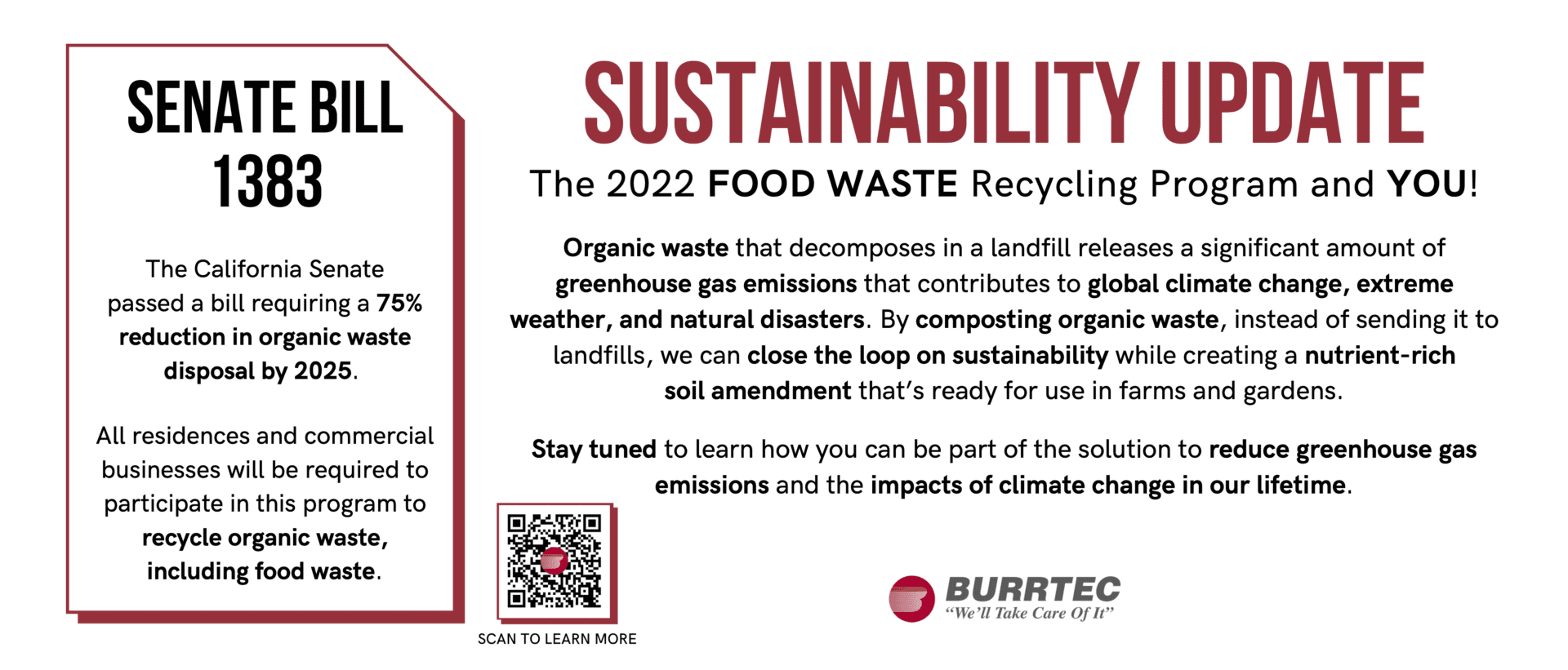
Recycling Legislation
Burrtec offers a full range of resources for recycling. We strive to provide excellence in service and customer satisfaction through the following:
SB 1383 Short-Lived Climate Pollutant Reduction Strategy of 2022
In September 2016, Governor Brown signed SB 1383 (Lara, Chapter 395, Statutes of 2016), which established targets to achieve a 75 percent reduction of the statewide disposal of organic waste by 2025. While some communities already have curbside organics collection service—including food waste collection—additional communities will implement organics collection programs to meet these goals.
Cities must establish organics recycling programs to all properties, including single family residential properties, multi-family residences, and businesses. Organic waste includes both food waste and other green waste, such as yard trimmings. In addition, cities must facilitate a food rescue program that creates a 20% increase in the recovery of currently disposed edible food from large food generators, including grocery stores, wholesale distributors, and restaurants. Under SB 1383, the food recovery target must be met by January 1, 2025.
Effective January 1, 2022, all California residences and businesses will be required to separate organic waste from other trash and non-organic recyclables and participate in an organics collection program. Burrtec is working with its Cities to provide programs for residents and businesses to comply with the requirements of this legislation in 2022.
Please stay tuned for more information and resources that will be available for you soon! To learn more about SB1383, please visit www.calrecycle.ca.gov/
Climate Change is an important part of who we are in California and with our deep-rooted responsibility to our businesses and residents, we will continue to provide new possibilities in environmental services.
Ready to watch us in action? Open your camera, point, scan and enjoy a short video of how we at Burrtec are doing our part in helping our communities be environmental stewards in action:
Watch our Videos on How to Recycle Food Waste at Home
Assembly Bill 939 California Integrated Waste Management Act of 1989
This state law requires each jurisdiction in California to divert at least 50% of its waste stream away from landfills either through waste reduction, recycling or other means. AB 939 also established an integrated framework for program implementation, solid waste planning, and solid waste facility and landfill compliance.
Assembly Bill 341 Mandatory Commercial Recycling Law of 2012
State legislation mandates businesses and multifamily residential dwellings with 5 or more units, generating 4 cubic yards of waste or more per week to recycle.
- All businesses and multifamily dwellings are encouraged to take advantage of available recycling programs and divert commercial waste from landfills.
How will compliance be monitored?
Jurisdictions (cities & counties) are required to assess whether businesses and multifamily dwellings are complying with the requirement to recycle. They are also required to identify and notify businesses that are not in compliance.
How can Burrtec help?
Burrtec can assist in establishing a program as well as provide necessary education and outreach to educate staff and tenants. Please contact your local customer service department or click here to start your recycling program.
AB 1826 Mandatory Commercial Organics Recycling Law of 2016
This state law requires businesses and multi-family complexes with 5 or more units that generate 2 or more cubic yards of waste to arrange for organics collection services. Organic waste includes food waste, food-soiled paper, landscape waste, and green waste.
Why Organics?
Mandatory recycling of organic waste is the next step toward achieving California’s aggressive recycling and greenhouse gas (GHG) emission goals. California disposes approximately 30 million tons of waste in landfills each year, of which more than 30 percent could be used for compost or mulch. Organic waste such as green materials and food materials are recyclable through composting and mulching, and through anaerobic digestion, which can produce renewable energy and fuel.
How will compliance be monitored?
Jurisdictions (cities & counties) are required to assess whether businesses and multifamily dwellings are complying with the requirement to recycle. They are also required to identify and notify businesses that are not in compliance.
How can Burrtec help?
Burrtec can assist in establishing a program as well as provide necessary education and outreach to educate staff and tenants. Please contact your local customer service department or click here to learn more about how your business can be compliant and start your recycling program. We encourage you to contact us and ask for your free waste assessment. We are here to help find the best program for you – We’ll Take Care of It!
AB 827 Mandatory Commercial and Organic waste: Recycling Bins of 2020
On or before July 1, 2020, AB341 and AB1826 covered businesses must provide organics and recycling containers at front-of-house to collect waste generated from products purchased and consumed on the premises. These containers must be placed adjacent to trash and be visible, easily accessible, and clearly marked.
How will compliance be monitored?
Jurisdictions (cities & counties) are required to assess whether covered generators are complying with the requirement to recycle. They are also required to identify and notify businesses that are not in compliance.
How can Burrtec help?
Burrtec can assist in establishing a program as well as provide necessary education and outreach to educate staff and tenants. Please contact your local customer service department or click here to start your recycling program.

